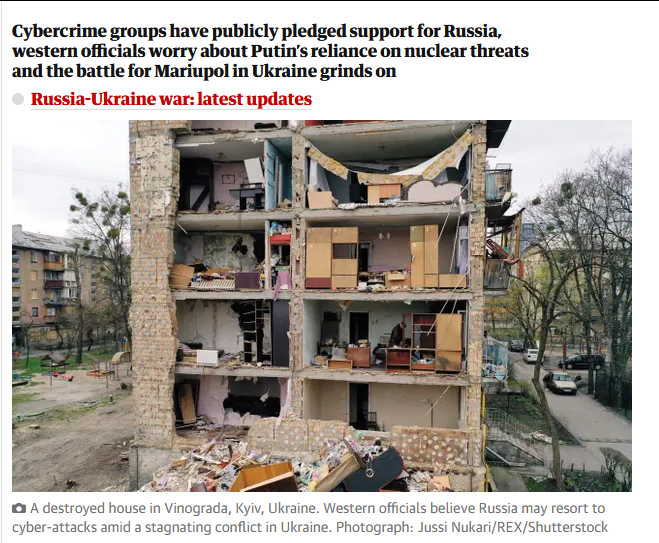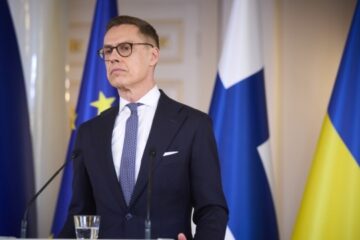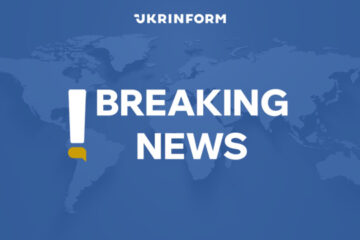
The US and four of its closest allies have warned that “evolving intelligence” shows that Russia is contemplating cyber-attacks on countries backing Ukraine, as the Kremlin’s frustration grows at its failure to make military gains.
Vladimir Putin used the launch on Wednesday of a powerful new Sarmat intercontinental ballistic missile (ICBM), capable of carrying ten or more warheads, to make nuclear threats against western countries.
The Sarmat has long been in development and test flights were initially due to start in 2017. The Pentagon confirmed that the US had been given notice of the test and was not alarmed. Western officials are more concerned by the increasing emphasis Moscow puts on its nuclear arsenal as its conventional forces have faltered in Ukraine. Ukraine’s access to weapons could determine fate of Donbas offensiveRead more
The Ukrainian army continued to put up resistance in the besieged and devastated city of Mariupol, but Putin’s Chechen ally, Ramzan Kadyrov, predicted that the last stand of the port’s defenders at the Azovstal steel works would fall on Thursday.
The Kremlin has made repeated threats against the many countries that have been supplying Ukraine’s army with modern weapons, and members of the “Five Eyes” intelligence sharing network – the US, Britain, Canada, Australia and New Zealand – predicted Moscow could also work with cybercrime groups to launch attacks on governments, institutions and businesses.
“Evolving intelligence indicates that the Russian government is exploring options for potential cyber-attacks,” they said in an official cyber threat alert on Wednesday, noting that “some cybercrime groups have recently publicly pledged support for the Russian government”.
“Some groups have also threatened to conduct cyber operations against countries and organisations providing materiel support to Ukraine,”the Five Eyes alert said. It warned that Russian state-sponsored cyber actors have the ability to compromise IT networks, to steal large amounts of data from them while remaining hidden, to deploy destructive malware and to lock down networks with “distributed denial of service” attacks.
Putin presented the test launch of the Sarmat ICBM as a major breakthrough that would bolster Russian deterrence, claiming it had the “highest tactical and technical characteristics and is capable of overcoming all modern means of anti-missile defence”.
“It has no analogues in the world and will not have for a long time to come,” he said. “This truly unique weapon will strengthen the combat potential of our armed forces, reliably ensure Russia’s security from external threats and provide food for thought for those who, in the heat of frenzied aggressive rhetoric, try to threaten our country.”
Moscow has formally warned Washington to cut off its arms supplies to Ukraine, but Joe Biden has stepped them up. The latest $800m tranche including howitzers and helicopters is being delivered.
The weapons from the US and its allies are arriving as Putin has unleashed a renewed offensive on the east and south of Ukraine, focusing on Mariupol, where the Ukrainian marine commander, Serhiy Volny, said his fighters at the steel works may not be able to hold out for much longer. President Volodymyr Zelenskiy has said an estimated 1,000 civilians are sheltering there.
Kadyrov, the head of Russia’s republic of Chechnya, whose troops have been fighting in Ukraine since the start of the invasion, said the Azovstal steel plant would be taken by Kremlin forces on Thursday.
“Before lunchtime, or after lunch, Azovstal will be completely under the control of the forces of the Russian Federation,”
Mariupol would be the biggest city to be seized by Russia since invading Ukraine eight weeks ago in an attack that has taken longer than some military analysts expected, seen over five million people flee abroad and turned cities to rubble.
A few dozen civilians managed to leave the strategically important southeastern port on Wednesday in a small bus convoy, according to witnesses quoted by Reuters, escaping the fiercest battle of the war.
However, Ukraine said late on Wednesday night that it was is ready to resolve the issue of unblocking Mariupol and evacuating civilians through diplomacy and has proposed to hold a “special round” of negotiations with Russia in the besieged city, officials said.
Ukraine negotiator and presidential aide Mykhailo Podolyak tweeted Kyiv was ready to talk “without any conditions”. He added: “One on one. Two on two. To save our guys, Azov, military, civilians, children, the living & the wounded. Everyone. Because they are ours. Because they are in my heart. Forever.”
Ukraine said it had so far held off an assault by thousands of Russian troops attempting to advance in what Kyiv calls the “battle of the Donbas”, a new campaign to seize the country’s eastern provinces.
The governor of Luhansk said on Wednesday that Russian forces controlled 80% of his region, which is one of two that make up the Donbas. Before Russia invaded, the Kyiv government controlled 60% of the Luhansk region.
Serhiy Haidai said the Russians, after seizing the small city of Kreminna, were threatening the cities of Rubizhne and Popasna. He urged all residents to evacuate immediately.
“The occupiers control only parts of these cities, unable to break through to the centers,” Haidai said on the messaging app Telegram.
Analysts say the offensive in the east could devolve into a war of attrition as Russia runs up against Ukraine’s most experienced, battle-hardened troops, who have fought pro-Moscow separatists in the Donbas for eight years.
Ukraine’s president, Volodymyr Zelenskiy, said in his nightly address on Wednesday that his country could develop “maximum speed” in joining the EU.
Speaking after meeting with the president of the European council, Charles Michel, Zelenskiy said the pair discussed Ukraine’s movement towards European integration.
“This is the historic moment when we can develop maximum speed in joining the European Union,” Zelenskiy said.
“We have already proved that the Ukrainian state and public institutions are effective enough to withstand even the test of war. We are already doing as much to protect freedom on the European continent as other nations have never done.”
World Bank president David Malpass has warned of a “human catastrophe” as food prices rise sharply in the wake of Russia’s invasion of Ukraine.
Like the Covid-19 pandemic, he said, the food crisis would hit the poorest people in the world the hardest because they will “eat less and have less money for anything else, such as schooling”.




